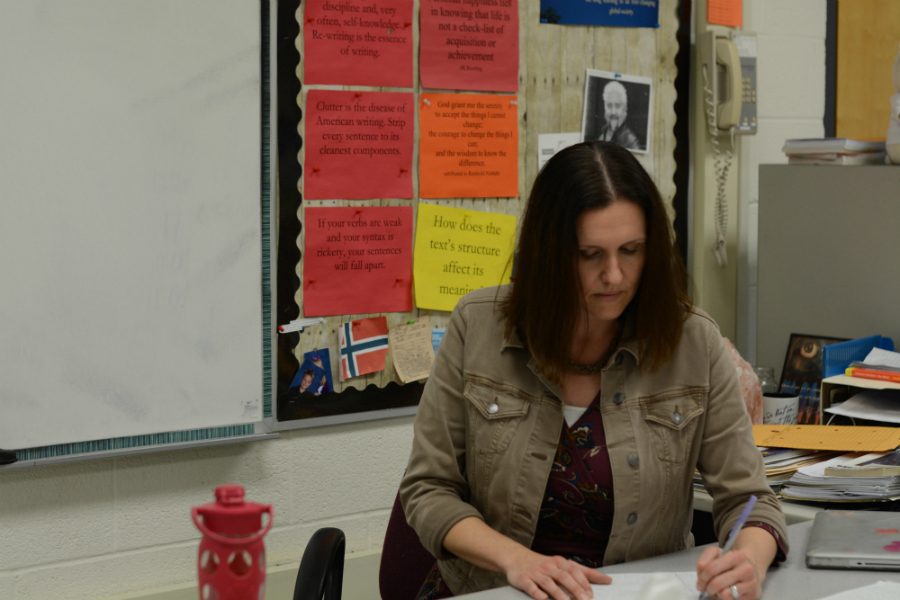Teachers face their own stressors
English teacher grades work.
January 20, 2019
In the classroom, many students are stressing over the multitude of tests they need to take and the piles of homework they receive from their classes. Yet, many fail to notice the stress teachers undergo to grade tests and prepare the material presented in class daily.
In 2015, all WA students took a Challenge Success survey focused on targeting issues in student stress. According to Westford Academy’s Challenge Success coach, Pam Webb, one of the statistics where WA stood out the most in comparison to other Challenge Success schools was the teacher support metric: 80% of students felt there was at least one adult in the school they could talk to.
The teachers at Westford Academy put in a lot of effort to not only improve the student experience but also be involved in their high-school environment. On top of that, they put in a lot of energy into helping the students understand the material to the best of their abilities.
Timothy Knittel, an Advanced Placement and College Prep Chemistry teacher, says he puts significant effort into preparing for his classes and making sure his students are learning in the best way possible. He makes it a priority to prepare new test materials every year, and it takes Knittel about four hours to prepare a new test. During the same week, he also has to think about the next unit in order to keep his students busy. To add onto this pile of work, Knittel also manages to grade all the tests on the same day that students take them.
“When I give a test, let’s say in AP chemistry, I take about four hours to make the test […] at the same time, as I give the test, I have the next unit ready to roll [which is] several hours of putting that together and then you have to grade the test […] I like to give it back the next day. [Those are] the real bad days […] when you’re giving a test, especially in AP Chemistry, it’s very stressful,” Knittel said.
Kim Hart, an English teacher who teaches many classes across multiple grades, is often stressed by the preparation that goes into teaching a class. The English college prep students have varying interest levels when it comes to learning the subject and have a diverse set of skills that Hart needs to take into consideration when planning activities for the class. The intensity of Hart’s Advanced Placement and Honors classes makes it even harder for her. It takes her five to six hours to grade essays from one class, which is a source of stress.
“It’s about what we have to balance, those of us who are in the humanities, because we have the immediate daily deadlines of planning good classes which takes a lot of thought and we are doing it every day and […] we want to present ourselves well and run a good class for our students. Grading all the little assignments also takes time and then grading the essays takes the most amount of time and the most mental investment,” Hart said.
Hart also mentions that most of the teachers in the English department have young children, who they need to also make time for and think about. The teachers need to balance their personal lives and their responsibilities at school, which can be overwhelming.
Michael Martell, a history teacher with two kids, believes teachers have the stress that students have in addition to the stress that comes along with being a parent.
“I have two kids at home. I have to worry about what they’re doing too which adds another level. So it’s the stress that [students] have plus that extra layer of making sure they [his children] are ready for school, they are on the bus and making sure they are doing good at school and they’re not sick. So there’s a little bit of an extra layer of stress too,” Martell said.
Rachel Connerty, a math teacher, has older kids now, so she has more time to focus on grading assignments and tests, but remembers being very stressed when her children were younger.
“I use my time at home because my kids are older. So, I have that time as opposed to running around after a little kid. When I was younger and was teaching and had younger kids, it was very stressful because I couldn’t get anything done, couldn’t do anything right,” Connerty said.









